Love Birds Food: Understanding Your Bird's Nutritional Needs
Discover how you can make sure your love bird has all the nutrients and vitamins they need for a healthy, happy life. Enjoy reading!
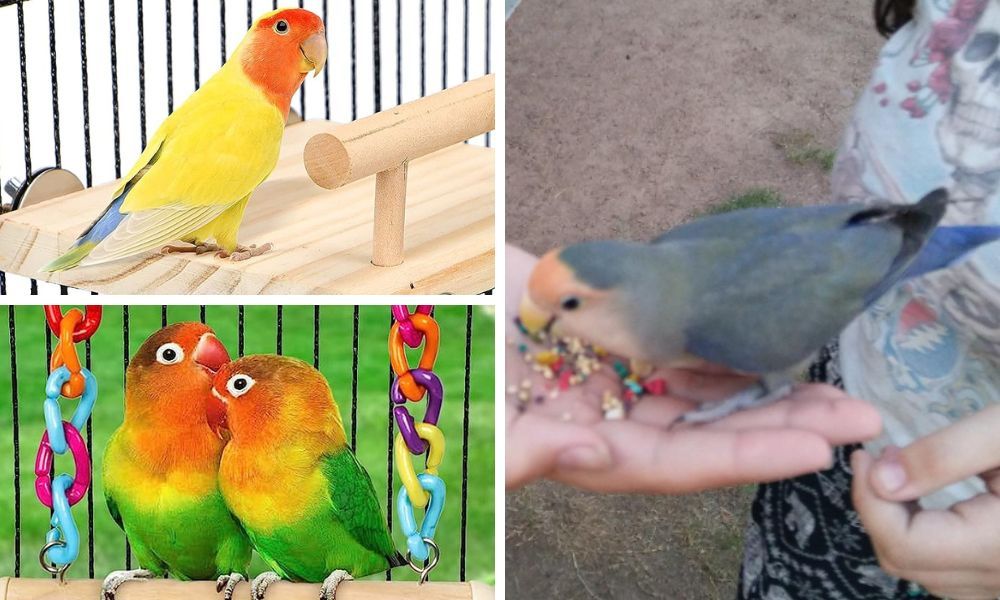
As a lovebird owner, one of your top priorities should be ensuring that your pet bird is receiving a balanced and nutritious diet. Despite the fact that lovebirds with their vibrant colors and playful personalities make great pets, many owners do not understand how crucial it is to feed their birds correctly.In this blog, we will help you learn about the dietary needs of lovebirds and the appropriate love birds food to feed them.
Lovebirds' Nutritional Needs:
Lovebirds require a diet that is high in nutrition, protein, vitamins, fiber, and minerals. A lot of lovebirds diet patterns on seeds are unhealthy and lack essential vitamins and minerals. While seeds should be an integral part of your bird's diet, they should not make up the entirety of their food source. Seeds are high in fat, and this can lead to obesity, which can shorten the lifespan of your bird. Leafy vegetables, fruits, cooked grains, and sprouted seeds should also be included in your bird's diet.
The Importance of Fresh Water:
Water is essential for the health of your lovebird. Fresh water and fresh food should be available to your bird at all times. Make sure that the water dish is cleaned every day, and the water should be changed twice a day to ensure that the water is fresh and cool for your bird. It is important to understand that lovebirds do not drink water frequently as they are originated from dry regions and will seldom seek water, so it is significant to monitor their water consumption.
Foods to Include in Your Lovebird's Diet:
Consuming the right food items would be necessary for every lovebird owner to understand, this could include fresh fruits and vegetables like; spinach, kale, carrots, and broccoli; whole grains, such as brown rice and quinoa; fresh herbs, like parsley and basil. A lovebird's diet can also include proteins, including hard-boiled eggs or cooked chicken mixed in with the seeds and grains. These additions to the diet are easy, cheap, and are healthier, and it would be a great addition to your bird's diet.
Foods to Avoid:
Lovebirds should not consume certain foods, including Avocado, alcohol, chocolate, caffeine, and fried and high-fat foods. A little bit of these items can be detrimental for your bird.
Special Dietary Needs:
There are a few medical conditions in lovebirds that require special dietary needs. For example, lovebirds with iron storage disorder require a low iron diet which involves avoiding iron-rich foods. It is always advisable to consult your vet for more customized instructions when your lovebird has any special dietary requirement.
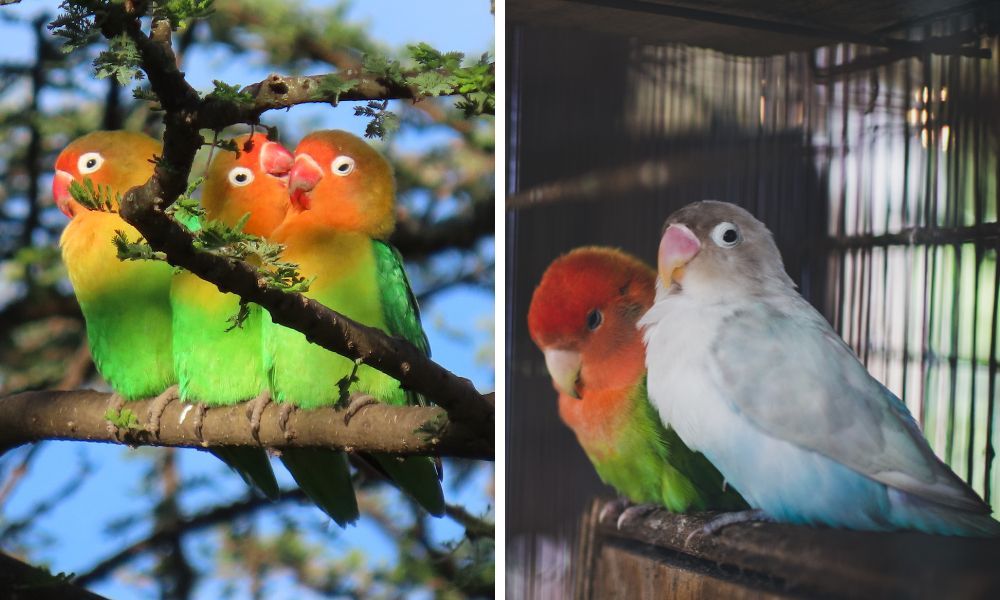
FAQs
What do lovebirds eat daily?
Lovebirds should have a daily diet that consists of seeds, fresh fruits and vegetables, whole grains, fresh herbs, and proteins such as hard-boiled eggs or cooked chicken. Some vegetables, with a high water composition (i.e. Iceberg or Head lettuce, celery) offer very little nutritional value but they like it a lot.
Can lovebirds eat bread?
Yes, but only small amounts occasionally. Bread is not a necessary part of a lovebird's diet and it is high in carbohydrates so it should not be a major part of the diet.
Are there any special dietary needs for lovebirds?
Yes, there are a few medical conditions in lovebirds that require special dietary needs. For example, lovebirds with iron storage disorder require a low iron diet which involves avoiding iron-rich foods. It is always advisable to consult your vet for more customized instructions when your lovebird has any special dietary requirement. Keep in mind to always monitor the amount of food eaten every day by each bird.
Can lovebirds eat rice?
Yes, lovebirds can eat rice in moderation. Rice is high in starch and calories and should only be offered as an occasional treat. Additionally, it's important to monitor your bird’s reaction to new foods before introducing them into their diet on a regular basis. Furthermore, it's essential to remove any uneaten food from the cage as this may spoil quickly. Lovebirds are very active birds, so a cage best suited to adequately house them must provide a lot of space.
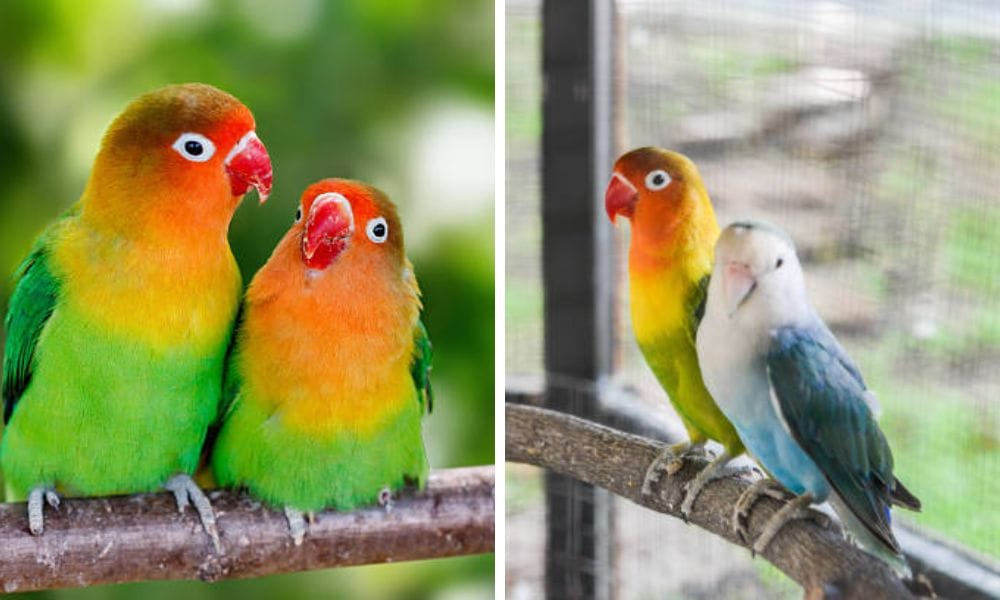
What type of food should I avoid feeding my lovebird?
Lovebirds should not consume certain foods, including Avocado, alcohol, chocolate, caffeine, and fried and high-fat foods. A little bit of these items can be detrimental for your bird. It is important to keep these items away from your lovebird.
What is the best way to feed my lovebird?
If you have ever cared for lovebirds or other pet birds before now, you already know there can be a big difference between different types of lovebird bird food. In general it is best to provide fresh nutritious food daily and keep a variety of different types of food available for your bird. Some commercial seed mixes may contain from 2 – 8 different kinds of seeds. Fresh foods should include seeds, fruits, fresh vegetables, and proteins. Additionally, always make sure that you are providing enough fresh water for your bird throughout the day. With proper nutrition and a balanced diet, your lovebird can live a healthy and happy life. You can read more about love bird food in our complete guide here or by clicking the picture below.
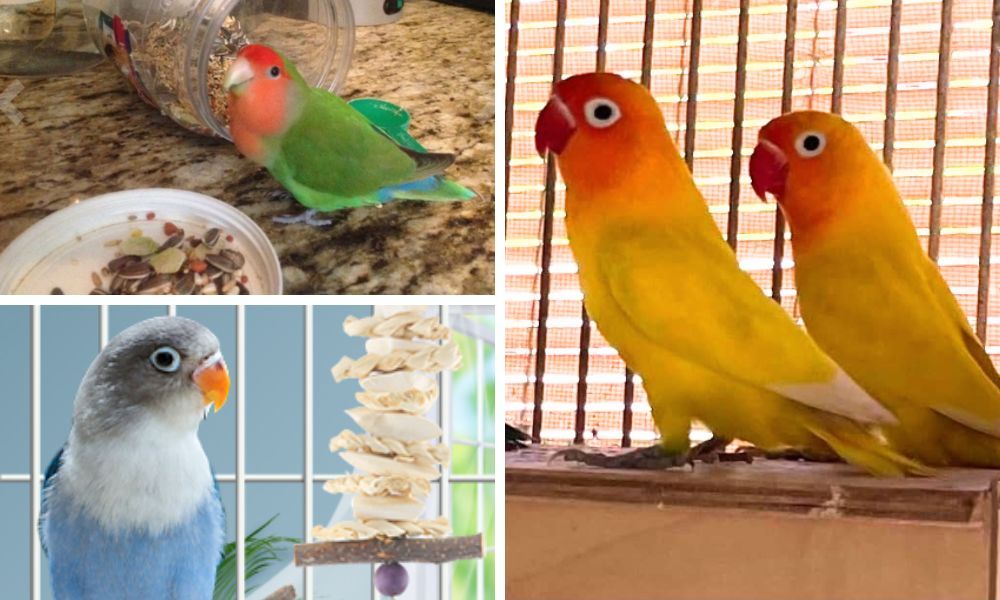
Can I give my lovebird treats?
Yes, you can provide some treats for your bird. A few food items that make great treats include cooked brown rice, boiled egg whites, and chopped vegetables like broccoli or spinach. Treats should only be given occasionally and in small amounts, as too many treats can lead to obesity. On Amazon, you can find an assortment of treats and lovebird food to help even the pickiest of birds find a balanced diet they enjoy.
What if my lovebird refuses to eat certain foods?
If your bird is not eating a variety of food items, it could mean that it has developed a preference for particular types of food. Try introducing the same food item with different preparation methods or combining other ingredients.
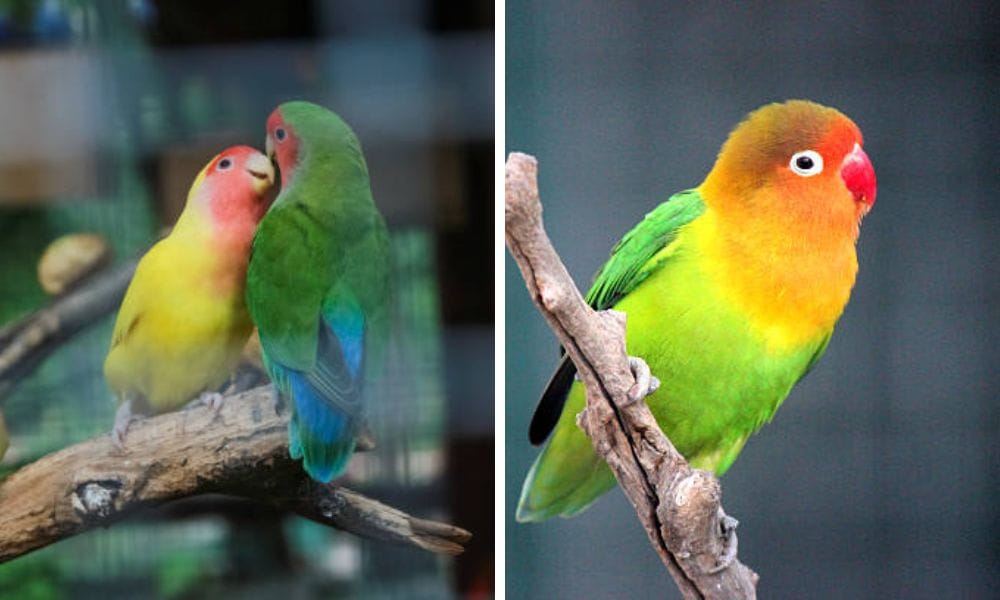
Can lovebirds eat peanut butter?
Yes, lovebirds can eat peanut butter in moderation as it is a good source of protein. However, it's important to avoid any commercially made peanut butter as these are often loaded with sugar and preservatives which could be unhealthy for your bird. Additionally, it's essential to monitor your bird's reaction when introducing new foods into their diet.
Is Egg good for lovebirds?
Yes, eggs are a great source of protein for lovebirds. Small amounts of raw egg can be fed to your bird occasionally. However, the egg should not become a regular part of the diet. Hard-boiled eggs or cooked scrambled eggs are healthier alternative options that can be given to your lovebird. Egg yolks contain high levels of fat so they should be avoided.
What are some other healthy snacks for lovebirds?
Some great snack options for your lovebird include nuts, apples, pomegranates, and cooked grains such as oatmeal or quinoa. Additionally, small pieces of dark leafy greens can also be given as a nutritious treat. Lovebirds really enjoy fresh fruits and vegetables.Additionally you can pick a high-quality seed mix to give the bird as a treat. Look for a seed mix that has a wide variety of seeds like millet, canary grass seed, hulled oats, niger seed, flax seed,sunflower seeds, safflower, and grape seeds. Wild Lovebirds would eat a great variety of seed types in the wild nature. Lovebirds eat sunflower seeds in their native habitats - they're one of their staple foods. Sunflower seeds are in most seed mixes, but can also be fed to lovebirds whole.
What kind of bird food is good for lovebirds?
Lovebirds eat a variety of seeds, fruits, berries and vegetation such as leaf buds that thye can find in the wild. A good bird food for your lovebird should contain a variety of seeds, grains, and other plant-based ingredients like fruits, vegetables, and nuts. Additionally, it is important to look for a high-quality bird food that is age appropriate and suitable for your specific breed of lovebird. A reputable brand of bird food made with natural ingredients is the best option. Some pet keepers suggests that a bird eating 75 - 80% of its diet in the form of pelleted food may not need supplements. Converting seed eating birds onto a formulated diet is not always easy. Mature birds are particularly troublesome to convert to pellets.
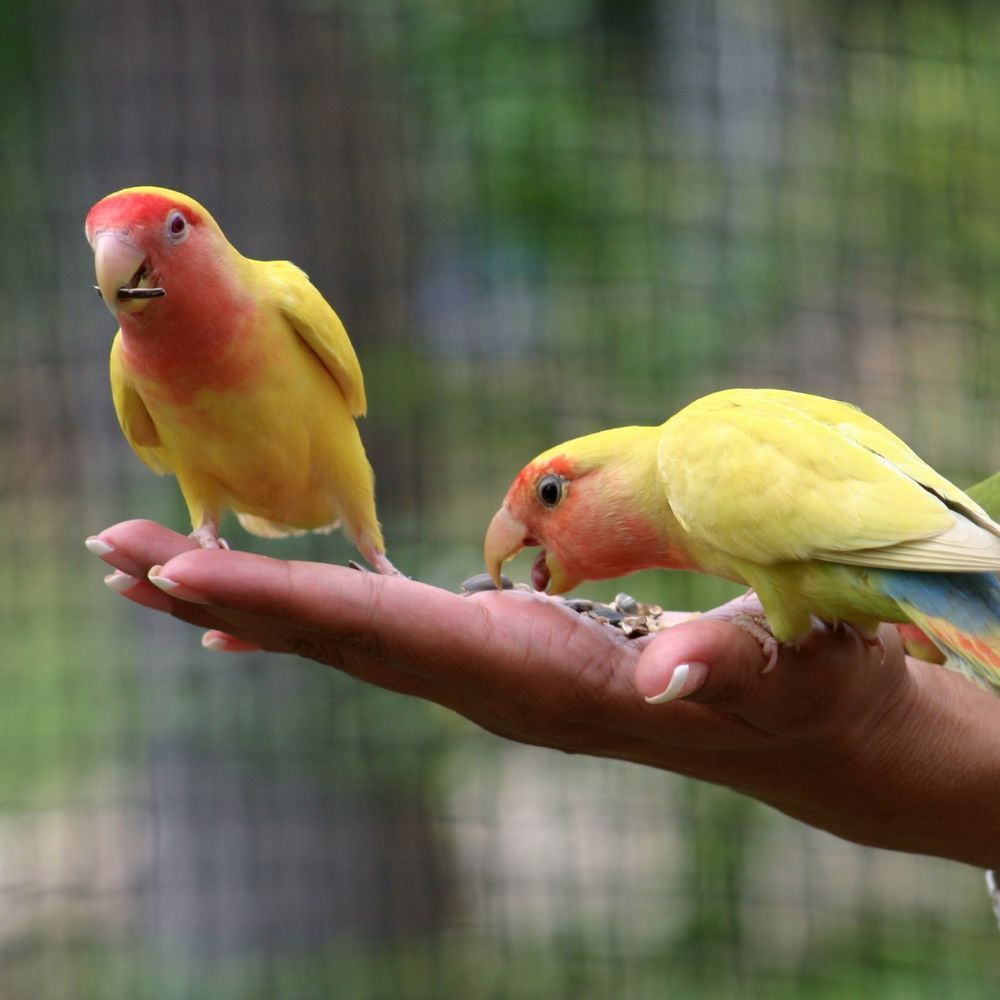
What other tips do you have to keep my lovebird healthy?
It is important to provide mental stimulation and exercise opportunities to your lovebird in addition to their varied diet. Toys and playtime are great ways to keep your bird active and reduce boredom. Additionally, providing plenty of per
What do baby lovebirds eat?
Baby lovebirds should be fed a high-quality diet to help them grow healthy and strong. A good option is to feed them a combination of freshly hatched baby bird formula, fruits and vegetables, eggs, legumes, grains, and seeds. Additionally, it's also important to offer food several times a day and adjust the amount offered as needed. Please note to offer fresh fruits and vegetables every day and clean all food and water dishes daily.
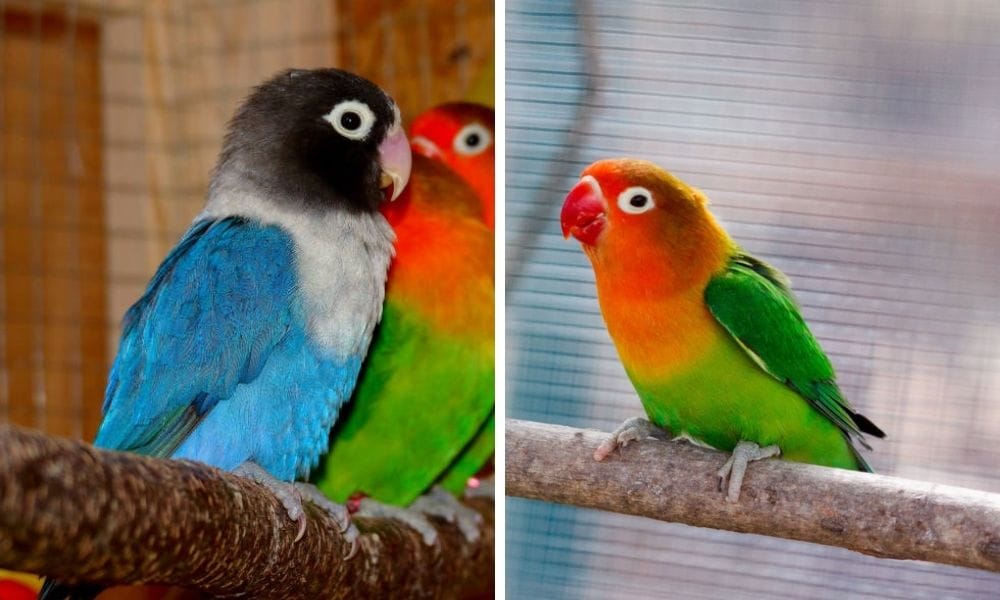
Do love birds need to be in pairs?
No, lovebirds can be kept as single birds or in pairs. However it is recommended that if they are kept as single birds, then they should have plenty of interaction with their owners to prevent loneliness and boredom. If you do decide to keep your bird in a pair, then introduce them carefully and slowly to reduce the chances of aggression between the two birds.
Do lovebirds like to be held?
Yes, lovebirds can be socialized to enjoy being held. If you are gentle and patient when handling them, they may even learn to be comfortable with it over time. It is important to give them the opportunity to get used to it slowly and not force it upon them as this could cause stress or fear. Additionally, always make sure your hands are clean when handling them and their cage is kept clean for optimal health.
At the end...
It is crucial for the owners to remember that a lovebird's diet should be healthy and balanced to ensure that they live a healthy life. It's not easy to make a drastic change to your bird's diet, and it may take a while to transition them over if their current diet is unhealthy. However, with plenty of testing and effort, you can make the best feeding decisions for your bird. Remember, the key to having a healthy and lively lovebird is regular checkups, a healthy diet full of fresh fruits and veggies, plenty of clean water and exercise. You can see our top 5 picks for the best bird food for lovebirds by clicking the button below!

